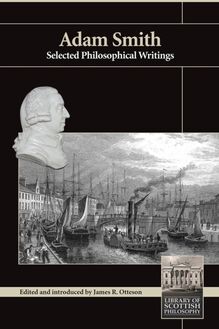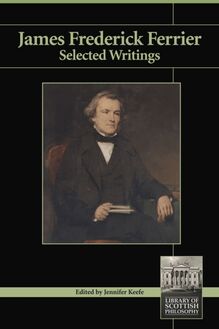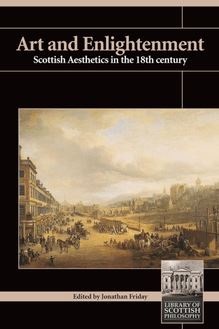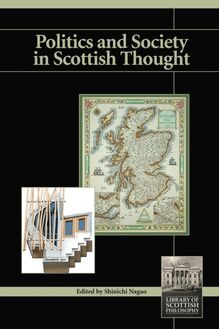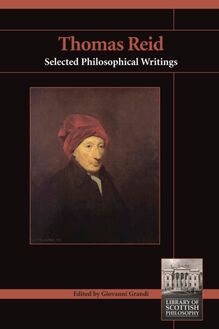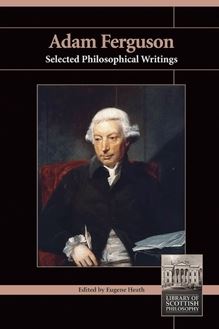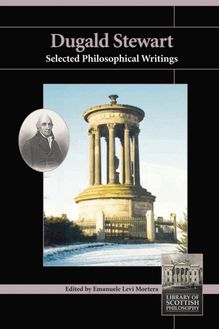Scottish Philosophy of Rhetoric , livre ebook
95
pages
English
Ebooks
2014
Vous pourrez modifier la taille du texte de cet ouvrage
Obtenez un accès à la bibliothèque pour le consulter en ligne En savoir plus
Découvre YouScribe en t'inscrivant gratuitement
Découvre YouScribe en t'inscrivant gratuitement
95
pages
English
Ebooks
2014
Vous pourrez modifier la taille du texte de cet ouvrage
Obtenez un accès à la bibliothèque pour le consulter en ligne En savoir plus
Publié par
Date de parution
25 mars 2014
Nombre de lectures
3
EAN13
9781845407537
Langue
English
Publié par
Date de parution
25 mars 2014
Nombre de lectures
3
EAN13
9781845407537
Langue
English
Title page
Scottish Philosophy of Rhetoric
By Rosaleen Keefe
LIBRARY OF
SCOTTISH
PHILOSOPHY
IMPRINT ACADEMIC
Publisher information
2014 digital version by Andrews UK Limited
www.andrewsuk.com
Copyright © Rosaleen Keefe, 2014
The moral rights of the author have been asserted. No part of this publication may be reproduced in any form without permission, except for the quotation of brief passages in criticism and discussion.
Originally published in the UK by Imprint Academic
PO Box 200, Exeter EX5 5YX, UK
Originally distributed in the USA by
Ingram Book Company,
One Ingram Blvd., La Vergne, TN 37086, USA
Full series details:
www.imprint-academic.com/losp
Series Editor’s Note
The principal purpose of volumes in this series is not to provide scholars with accurate editions, but to make the writings of Scottish philosophers accessible to a new generation of modern readers in an attractively produced and competitively priced format. In accordance with this purpose, certain changes have been made to the original texts: Spelling and punctuation have been modernized. In some cases the selections have been given new titles. Some original footnotes and references have not been included. Some extracts have been shortened from their original length. Quotations from Greek have been transliterated, and passages in languages other than English translated, or omitted altogether.
Care has been taken to ensure that in no instance do these amendments truncate the argument or alter the meaning intended by the original author. For readers who want to consult the original texts, full bibliographical details are provided for each extract.
The Library of Scottish Philosophy was originally an initiative of the Centre for the Study of Scottish Philosophy at the University of Aberdeen. The first six volumes, published in 2004, were commissioned with financial support from the Carnegie Trust for the Universities of Scotland. In 2006 the CSSP moved to Princeton where it became one of three research centers within the Special Collections of Princeton Theological Seminary Library, and with the Seminary’s financial support more volumes have been published. Scottish Philosophy of Rhetoric is the fifteenth volume in the series and has been prepared for publication by Alexander Peterson.
Acknowledgements
The CSSP gratefully acknowledges financial support from the Carnegie Trust and Princeton Theological Seminary, the enthusiasm and excellent service of the publisher Imprint Academic , and the permission of the University of Aberdeen Special Collections and Libraries to use the engraving of the Faculty of Advocates (1829) as the logo for the series.
Gordon Graham,
Princeton, October 2013
Introduction, Rosaleen Keefe
Scottish Rhetoric and Scottish Philosophy
The Scottish contribution to the creation of modern Western institutions is one of the most surprising chapters in the history of modernity. It is counterintuitive to suppose that such a small and low profile country should be the source of philosophical innovations that forged the conceptual foundations of political, social, psychological, educational, and economic systems still functioning today. It may also seem counterintuitive to regard the oft-forgotten discipline of rhetoric as central to the philosophical practice that produced these foundations. So in imagining a volume on the Scottish Philosophy of Rhetoric, it may appear overambitious to link the Scottish philosophical tradition to the Scottish rhetorical texts so closely, especially since the Enlightenment rhetorical tradition, particularly when viewed from the perspective of writing and reading pedagogy, is often seen as simply an obtuse and dated addendum to the main philosophical tradition.
On the other hand, within rhetorical history, the eighteenth century is widely regarded as the central nexus of the development of many modern conversations about language, language-learning, social and cognitive development through language, semantics, linguistics, discourse theory, and civic participation. Further, any consideration of eighteenth- and nineteenth-century rhetoric must focus on the contributions of Scottish writers and professors such as George Campbell and Hugh Blair. The selections in this volume have been chosen in order to show readers both why the Scottish contributions to rhetoric are important for those conversations, and also how essential their place is in the Scottish philosophical tradition.
To whom amongst the many eminent Scottish Enlightenment thinkers should we look first for the key texts of Scottish rhetoric? Rhetoric, though a subject of widespread interest at that time, is hard to confine within any one discipline, as indeed it continues to be. Linda Ferreira-Buckley, describing the broad state of eighteenth-century rhetoric, points out that ‘then, as now, “rhetoric” is an expansive phenomenon and a slippery term. Understanding the eighteenth-century requires looking beyond disciplinary boundaries that may have come to seem natural’. [1] The arguments regarding aesthetics, epistemology, and the ontology of perception, philosophy of mind, and logic put forward by Francis Hutcheson, Alexander Gerard, Lord Kames, and Thomas Reid in response to the innovations in philosophy, logic, and method that were made by Bacon, Newton, Locke, and Berkeley are now fixed parts of the philosophical context. But while the Scottish philosophers themselves considered rhetorical inquiry and teaching central to their own work, their ideas on rhetoric and language were developed even further by their students, Campbell and Blair (and several decades later, Alexander Bain), all of whom wrote rhetorical theory and textbooks that influenced generations of language learners on several continents. Often, these texts are taken to represent only the Scottish rhetorical tradition, but they have an equally important role in the philosophy of language.
The selections in this volume comprise a unique introduction to Scottish rhetorical innovations that have generally been overlooked in studies of the philosophical tradition, while at the same time being used to oversimplify the rhetorical tradition. This volume is the first of its kind to choose texts in such a way as to demonstrate, and not simply refer to, these essential connections between Scottish philosophy and Scottish rhetoric. Organized loosely by biographic and bibliographic succession, the aim is to exhibit the variety and vigour of Scottish rhetorical thinking, while placing it within the broader conceptual structure developed and articulated by George Campbell and Hugh Blair. It requires some flexibility on the part of the reader to examine philosophical texts for their rhetorical theory, and at the same time read pedagogical texts for their underlying philosophy of language. Only in this way, however, do we arrive at a more complete picture of Scottish rhetoric, as a vibrant and resonant body of rhetorical theory and practice. It is my hope that a reader from any discipline, not only those interested in Scottish philosophy or rhetorical theory, will gain a new comprehension of the centrality of the Scottish rhetorical tradition to these topics.
Rhetoric and Logic in Eighteenth-Century Scotland
In the classical tradition, rhetoric is one of the three cornerstones of a basic education in the liberal arts, the trivium , which consisted of logic, rhetoric, and grammar. The study of rhetoric, defined by Aristotle as the ‘ability to see, in each particular case, the means of persuasion’, [2] was since ancient times considered a first order in education; it is easy to see how along with grammar, the basic means for forming intelligible units of speech, and logic, the art of constructing rationally valid arguments, these three together create a fitting foundation to intellectual inquiry. All of the authors included in this volume would have had a thorough background in the history and practice of rhetoric and logic. The relationship of logic to rhetoric is of particular importance to the development of what Wilbur Samuel Howell, in his seminal histories of eighteenth-century logic and rhetoric, [3] termed the ‘new rhetoric’ of Enlightenment thinkers, and it is also crucial to understanding the rhetorical innovations of the Scottish Enlightenment.
Logic had undergone a transformation since the works of Francis Bacon, who persuasively condemned the classical Aristotelian syllogism as an insufficient tool for genuine scientific inquiry. Bacon argued that science required a logical form that allowed for observation and inquiry, and that syllogism and the art of deduction could only form arguments from what is, essentially, already known. A new logic of induction was necessary for the new scientific method. This inductive method relies not on a priori knowledge, but rather on observation of particulars, and probabilities of generalities. The discipline of logic, therefore, needed to be reformed. Now, Alexander Broadie argues that ‘in the forefront of this discussion on logic in the mid-eighteenth century’ and ‘pressing for debate toward further modernization of the discipline’ [4] was none other than Thomas Reid. Reid is much better known for his development of Scottish Common Sense philosophy, dealing with the more abstract branches of epistemology and philosophy of mind, but it is important to note that, like many of the thinkers included here for their important work in rhetorical theory, he was as well-versed in science and mathematics as in philosophical inquiry. This is essential to understanding the motivation for the rhetorical innovations he, like others, advocated. In fact, the relation of logic to rhetoric and t
